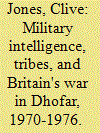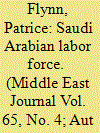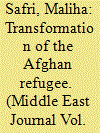| Srl | Item |
| 1 |
ID:
110342


|
|
|
|
|
| Publication |
2011.
|
| Summary/Abstract |
Uniquely for a country its size, Qatar has emerged as one of the world's most proactive mediators in recent years. Motivated by a combination of international prestige and survival strategies, the country has sought to position itself as a neutral peacemaker in many of the international and intra-national conflicts brewing across the Middle East region. In three of the most notable cases in which it has involved itself - Lebanon, Sudan, and Yemen - Qatar has proven itself to be a capable mediator in reducing tensions but not, crucially, in resolving conflicts. Qatar's successes have been facilitated by a combination of its perceived neutrality by the disputants, the vast financial resources at its disposal to host mediation talks and offer financial incentives for peace, and the personal commitment and involvement of the state's top leaders. These successes, however, are often checked by limited capabilities to affect long-term changes to the preferences of the disputants through power projection abilities, in-depth administrative and on-the-ground resources, and apparent underestimations of the complexities of the deep-rooted conflicts at hand. Qatari mediation efforts are likely to continue in the foreseeable future, but their outcomes are also likely to remain mixed.
|
|
|
|
|
|
|
|
|
|
|
|
|
|
|
|
| 2 |
ID:
110343


|
|
|
|
|
| Publication |
2011.
|
| Summary/Abstract |
This article examines the hitherto overlooked role of military intelligence in the Dhofar campaign of 1970-1976. Drawing on an array of new sources, it not only details the functional role of military intelligence in the campaign, but also makes a distinction between "attitudinal" and "behavioral" support in understanding the "human terrain," and thereby how military intelligence helped secure acceptance of the regime of Sultan Qaboos bin Sa'id among the tribes of Dhofar.
|
|
|
|
|
|
|
|
|
|
|
|
|
|
|
|
| 3 |
ID:
110349


|
|
|
|
|
| Publication |
2011.
|
| Summary/Abstract |
In December 1981, a group baptized al-Jabha al-Islamiyya li Tahrir al-Bahrayn [The Islamic Front for the Liberation of Bahrain] unsuccessfully attempted to carry out a coup d'état in Bahrain. The group published newsletters and books in which it described its attempts to overthrow the Al Khalifa ruling family and install Iranian-style Islamic rule instead. These documents provide evidence for the group's involvement with the Iranian Revolutionary Guard Corps, and of the support the Iranian regime provided for their activities against the Bahraini government.
|
|
|
|
|
|
|
|
|
|
|
|
|
|
|
|
| 4 |
ID:
110345


|
|
|
|
|
| Publication |
2011.
|
| Summary/Abstract |
This article provides a framework from which to explore the Saudi labor force, drawing from the national labor market model designed by the US Department of Labor in the 1940s and applied to the Saudi workforce using data from the Saudi Arabian Central Department of Statistics and Information. The findings provide the first comprehensive statistical portrait of the Saudi labor force and a baseline from which to systematically track expected increases in labor force participation, especially among Saudi women and youth, in the decades to come.
|
|
|
|
|
|
|
|
|
|
|
|
|
|
|
|
| 5 |
ID:
110347


|
|
|
|
|
| Publication |
2011.
|
| Summary/Abstract |
In the last 30 years, the social and linguistic articulation of the Afghan in Pakistan and Iran has gone from muhajir [refugee], to migrant, and even to terrorist. This article provides an overview of that transformation to demonstrate that it depends more on external factors rather than any fundamental change in the conditions structuring Afghan migration. Examining the migration regime operating between Afghanistan, Pakistan, and Iran further confirms the problems of a refugee/migrant dualism.
|
|
|
|
|
|
|
|
|
|
|
|
|
|
|
|